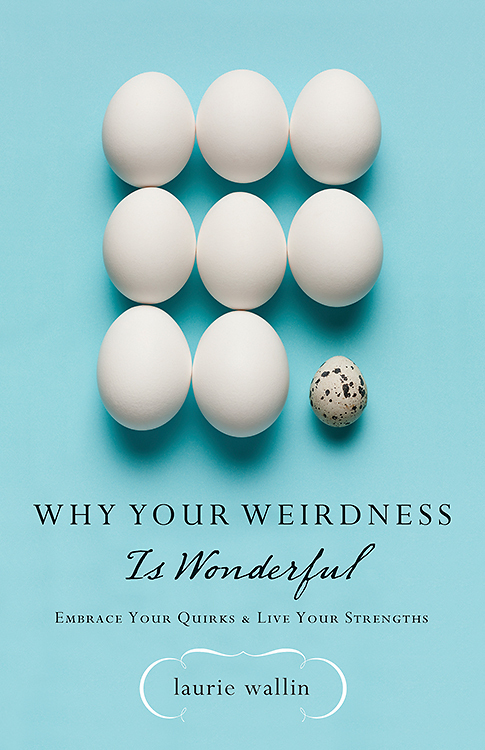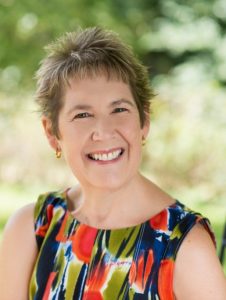Who is Laurie Wallin?
I’m so glad you asked! She’s a writer friend and also the parent of a child with special needs. Until her writing career went into high gear last year, she was a regular guest blogger at www.DifferentDream.com, my special needs parenting website.
Laurie’s first book, Why Your Weirdness Is Wonderful, will be released by Abingdon Press on March 18. (The paperback and Kindle versions are available for pre-order on Amazon now.) I interviewed Laurie about why she wrote a book encouraging women to view the quirky things they don’t always like about themselves as the way God designed them. Here’s what she had to say.
When did the idea that our individual quirks–those personal weirdnesses that drive us crazy sometimes–are part of who God created us to be?
The pivotal moment was while reading a colleague’s blog post. She shared how frustrated she was with her tendency to overthink things, and how she prayed God would make her different. I was mad! Not at her, but at the situation. . . that clearly gifted people spent so much time lamenting how they are. And how easy a strategy that would be for Satan to use to keep us distracted from living well. If we’re fighting who we are most of the time, we’re missing out on the reflection of God’s image that is trying to show through us. I commented on this post, asking what if God made you that way because something about that tendency reflects something about Him, rather than it being a flaw? We went back and forth about the idea for a few comments, and ultimately, she said, “You need to write a post about this.” I did, it went viral, and the rest, as they say, is history!
Why do you think it’s important for women to see their weirdness as wonderful?
Women, in particular, have this fog of expectation clouding our view of ourselves and each other. The more I studied personal strengths, the more I noticed that:
- the things that annoy me in other people are them living their strengths and either me not appreciating them in the situation, or them not living them in a loving way; and
- the things that annoyed me about myself suffered from the same two issues.
So I started asking myself “What strength is she trying to live right now?” when I sensed jealousy or frustration or judgment creeping up with a friend. You know what happened? Where I used to feel insecure, I started noticing a desire to see the good in others and celebrating—affirming—the God-glimpses I saw in them. As a woman, to be able to feel secure in the face of others is a HUGE change to what we often experience. It makes us allies, supporters of each other, champions of what God’s doing in each others’ lives, instead of defenders of what we think is insufficient in ourselves.
In the book you talk about the dark sides and positive sides of our quirks. Could you give a few examples for readers?
As a Star Wars fan, I’ve always related to the whole Dark Side, Light Side (or, as I call it in the book, Life Side) idea. God invests tendencies in us, and we either love Him and others with them (reveal their Life Sides) or we live from fear (Dark Sides). The most common struggle strengths I hear about from people are tendencies to overthink things, be too sensitive, worry too much, argue too much, or be controlling. There are a lot of possible strengths hiding in these Dark Sides, and maybe they come from different strengths in different situations. For example, overthinking can be the Dark Side of being analytical, an achiever, someone who is contextual and sees connections between anything done or said now, and what it will effect. It’s not an exact science, but the important thing is to allow the question—to stop fighting who we are long enough to let God show us what is possible in us right then.
Can you pinpoint a quirk of your own that you now appreciate, even though it once drove you crazy?
Mine is the need to make a difference and matter to people. Anyone who knows anything about Christian beliefs will see pride all over that. For years, I fought God, asking Him why I need to be involved in projects that are high profile and far-reaching. It was a sore spot and something I wanted to hide about myself for years. When I started writing this book, I had to sit down and face my big-scary-strength/weakness. God brought to mind projects I’d taken on over the years that nobody else wanted or would touch. Yes, I wanted to be the one at the mic at retreats. But I also was the one who saw a need in my then-classroom and hunted down grants, applied for them, and pulled in thousands of dollars of funding and 20 computers for my science program. I’m a big thinking gal, and in God’s hands it can bring big good. In mine, of course, it’s prideful and annoying. The job every day for me is to listen to His voice and only go after the big fish He leads me to pursue, the way He’s leading me to do it!
How can women embrace their weirdness? Where should they start?
First, we have to decide to suspend judgment about our natural tendencies. This one trips a lot of people up. They’re scared that if they do that, they’re dropping their moral standards. But that’s not what I’m saying. I’m asking people to stop assuming they understand God’s design in the ways they’ve always thought, acted and reacted in life. His thoughts are higher than ours, after all, right? So step one is to notice when we’re making ourselves feel bad about some way we are, like when we use negative words to describe ourselves (overthinker, worry wart, impatient, lazy. . .) and stop right then to chat with God about it. To say, “What natural desire or strength of mine is wanting to come out right now? How would YOU reveal that trait, God?” Then, let God tell you what He thinks. And keep eyes open to see His answers to the questions unfold in life and relationships.
How do you suggest women maximize their quirks to build God’s kingdom?
The more we listen to what God meant when He designed us the way He did—quirks and all—the more we let God reveal His heart for the world around us. The more we’re attuned to the unique ways God designed us to think, communicate, plan, care and relate with others, the more people are drawn to Him, and the kingdom grows.
How can they maintain a balanced perspective about quirks and weirdnesses?
Our weirdness—our blend of strengths and their quirky upside down versions—stays balanced when we focus it on loving God with all our heart, soul, mind and strength, and loving other people as ourselves. The Greatest Commandment is our great balancer in this tightrope walk of living our weirdness wonderfully.
Where can people connect with you and buy your book?
Come visit me and check out more about the book at http://bit.ly/WeirdWonderful, or stop by my facebook page at http://www.facebook.com/LivingPowerLifeCoaching
Anything else you’d like to mention?
I certainly hope you’ll grab a copy of my book and allow me to walk this road with you, but whether you buy my book or not, you owe it to yourself to learn more about your strengths. Whether it’s Gallup’s StrengthsFinder program, the Meyers-Briggs assessment, or Gary Chapman’s Love Languages assessment. . . find out who God designed when He made you. Because if you’re not being all God designed you to be, there’s a hole in the world that nobody else can or will ever fill.


